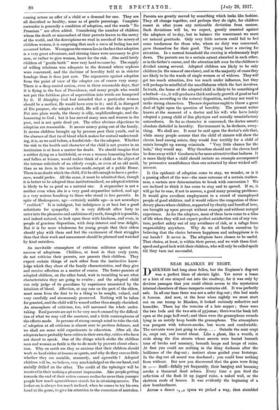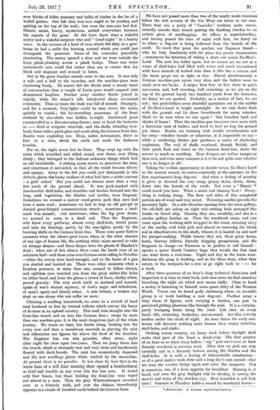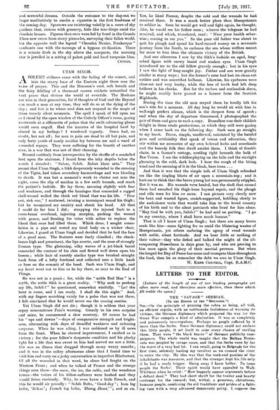NEAR BLANKEN BY NIGHT.
1)ARKNESS had long since fallen, but the Engineer's dug-out was a perfect blaze of electric light. Yet never a beam or a hint of one strayed out into the roadway, for it was only by devious passages that you could obtain access to the mysterious internal chambers of these ramparts centuries old. It was perfectly safe. In all our lines there was nets safer dug-out; this had made it famous. And now, at the hour when nightly we mud start out on our tramp to Blanken, it looked curiously seductive and homelike. There lay the remains of a late supper ; there were the two beds and the two ries of pyjamas; there waa the book left open at the page half-read; and there were the gramophone records lying in an untidy heap beside the gramophone. The atmosphere was pungent with tobacco-smoke, but warm and comfortable. The servants were just going to sleep. . . . Outside the mist crept in, crept out, and round about. Like a ghost, like a wraith, it stole along the dim streets whose secrets were buried beneath tom of bricks and masonry, beneath heaps and heaps of ruins. At first you could see nothing in the filmy darkness after the brilliance of the dug-out; instinct alone guided your footsteps. In the dug-out all sound was deadened ; you could hoar nothing from without. But now you discovered that the guns were firing
in ,— itself—fitfully yet frequently, their banging and booming
awoke a thousand dead echoes. Every time a gun fired the reflection of the flash lit up jagged ruins, a naked wall, or the skeleton roofs of houses. It was evidently the beginning of a slow bombardment.
Across a desert 4,1_0. space we picked a way, then stumbled
over blocks of fallen masonry and balks of timber in the lee of a walled garden. One felt that tom-cats °ugh{ to be yowling and spitting on the top of the wail; but even the tom-cats had fled. Silence, moist, heavy, mysterious, settled everywhere between the reports of the guns. At the Gate there were a wakeful sentry and a wakeful sergeant who said " Good-night " in a hearty voice. In the recesses of a kind of cave which did duty as a gate- house he had a noble fire burning, around which you could just distinguish the prostrate forms of his comrades peacefully slumbering. The sentry opened a door and we wore outside the linos, plonk-plonking across a plank bridge. There was water underneath—you could feel rather than see it.--water that lay black and stagnant and steamed to listen.
Out in the grass familiar sounds came to the ears. It was only a mile and a half to the trenches, and the machine-guns were chattering busily. No sooner did the Both° start a steady burst of conversation than a couple of Lewis guns would respond with demoniacal laughter. Further away another Boche joined in angrily, while the sniper's rifle interjected sharp occasional comments. Thus at times the dusk was full of sounds Strangely, and for a moment, Very-lights could be seen above the mists, quickly to vanish ; the far-stretching panorama of the front outlined by star-shells was hidden to-night. Southward great cannon rolled in a dim unceasing chorus; near at hand the batteries in — fired at irregular intervals, and the shells, whistling over- head, burst with a quick glare and crash along the German front-line. Bombs were exploding too. Deep, sullen detonations, three or four at a time, shook the earth and made the darkness tremble.
For us, the night never lost its fears. They crept up with the mists which wreathed and sidled round, now dense, now lifting thinly ; they belonged to the hideous unknown things whioh lurk on old battlefields. A sinking moon strove to penetrate the mist, and sometimes it succeeded, so that all the world became silvery and opaque. Away to the left you could just distinguish in this delicate gloom the husky outlines of what had been a noble convent —a girls' school. But you could not discern more than a very few yards of the ground ahead. It was pock-marked with innumerable shell-holes, and stumbles and lurches forward into the long, rank vegetation, the thistles and nettles, were frequent. Sometimes we crossed a narrow weed-grown path that once had been a main read; sometimes we had to leap an old gun-pit or disused grass-fringed communication trench ; sometimes a land- mark was missed ; and sometimes, when the fog grow dense, we scorned to come to a dead end. Then the Engineer, who knew every pathway, almost every shell-hole, would Fume and take his bearings, partly by the star-lights, partly by the bursting shells on the German front-lino. Thom were queer furtive moments when the silence grow tense, when, in the utter absence of any sign of human life, the soothing white mists seemed to take on strange shapes—and those shapes were the ghosts of Blanken's dead ; when out of this silence there came the harsh cries of an unknown bird—and those cries were German souls calling to Paradise —when the nerves were hard-wrought, and at the boom of a gun you started and hurried on. There were other moments when a formless presence, or more than one, seemed to follow always, and sightless eyes watched you from the great socket-like holes on either hand, and from the gloom a crowd of faces, chalky-white, peered gravely. The very earth itself, so maimed and scarred, spoke of war's eternal mystery, of God's anger and tribulation, of man's agony and bloody sweat. A mile behind, a broken city slept as one sleeps who can stiffer no more.
Climbing a sandbag breastwork, we come to a stretch of hard road bordered at first by twisted willows which convey the fancy of fir-trees in an upland country. This road runs straight into the front-line trench and on into the Gorman lines ; swept by more than one machine-gun, it in the most dangerous part of the whole journey. We waste no time, but hustle along, bending low, for every now and then a moonbeam succeeds in piercing the mist and silhouettes our figures far above the level of the trenches. Tho Engineer has run this gauntlet, often alone, night after night for close upon two years. Then we jump down into the trench, which is obviously new and very clean and handsomely floored with duck-boards. The mist has momentarily dispersed and the new sandbags gleam white, washed by the moonshine. At present there is no parades. It was close by here that in the warm haze of a still Juno morning there opened a bombardment as brief and terrible as any even this war has seen. It lasted only four hours, but those holding the front-line wore wiped out almost to a man. Then the grey Werttembergers swarmed over at a leisurely walk, and now the château immediately opposite is a couple of hundred yards behind the Gorman lines.
We have not passed more than two of the neatly made traverses before the rich accents of the Far West are borne to our ears. There they are, a party of " Canucks," working quite uncon- cernedly outside their trench putting the finishing touches to an artistic piece of sandbagging. An officer is euperintending. and having passed the time of night with him, we hurry on to where a dug-out is being hollowed from the bowels of the earth. To reach this point the quicker. our Engineer friend— who by long familiarity with the place has grown venturesome —announces his intention of taking a short cut across No-Man'c- Land. The mist has fallen again, but no' sooner are we out in a waste of shell-holes lintf filled with water and much encumbered with loose strands of barbed wire than it lifts like a curtain and the moon peeps out as light as day. Almost simultaneously a German machine-gun opens very close and the bullets seem to sizzle over our backs. A sniper fires four or five shots in quick succession, and, half standing, half crouching, as we are on the top of the ground barely two hundred yards from the Germane, we fancy we are spotted. Probably, as a matter of fact, we are not ; but probabilities seem doubtful quantities out in the middle of No-Man's-Land in bright moonlight. So we sink down then with the ground and lie there breathlessly for many minutea. Shall we be seen when we ries, again ? One breathes hard and thinks of home ! Then the machine-gun traverses once nem) with a hurricane rush of bullets, and head to heel we hug the ground yet closer. Bombs are bursting with terrific reverberation not far away—whether hostile or otherwise, it is impossible to say— while a retaliating Stokes gun produce-3 a series of shattering explosions. The wail of shells overhead, though British, and their quick flash and burst on the German front-lino, shake the nerves as much as anything. Most dangers are rather imaginary than real, and even more common is it to be not quite sure whether one is in danger at all !
Taking the nerlicet opportunity to double across No-Man's-Land to the nearest trench, we arrive eventually at tho entrance to the first experimental deep dug-out. And what a fooling of security it gives to descend the very steep, greasy stairs, down, down. down into the bowels of the earth. Not even a "Minnie ". could touch you hero. What a moist and clammy heat ! Every- thing is reeking damp. The floor and sides of this completed portion are of wood and very moist. Wavering candles provide the necessary light. In a side-chamber opening from the main gallery. the off-shift are asleep on eight wire-netting beds arranged like bunks on board ship. Snoring they are, manfully, and also in a similar gallery further on. Then the woodwork steps, and you come upon the working-shift stripped to the waist, sweating away at the earthy wall with pick and shovel or removing the bluish soil in wheelbarrows to the shaft, whence it is hauled up and used for parapet-making. Welsh miners they are, those groat damp. hairy, brawny fellows, literally dripping perspiration, and the Sergeant in charge—or Foreman as he prefers to call himself— speaks a queer North Country lingo that recalls tho fleet time one went down a coal-mine. Night and day in the warm semi- darkness the gang is working, and so for throe days, when they return to the ramparts for a rest or go right bank to — for a week.
After three-quarters of an hour's deep technical discussion and inspeotion it is time to start back, and-once more we find ourselves breathing the night air which now seems chilly. Close at hand a sentry is humming to himself some queer ditty of the Western World. Voices can be heard gaily chattering whore an invisible group is at work building a now dug-out. Further away a long chain of figures, each carrying a burden, can just le perceived gliding phantom-like through the mist. It is a carrying- party tramping home along the reed. Life stirs on every hand—life, swarming, workaday, unconcerned. Ant-like activity seethes under the cloak of night. An hour hence the early sun- beams will discover nothing more human than empty trenches. shell-holes, and stinks.
Striking acmes country, we hurry back before daylight shall make that part of the front a death-trap. Tho first quartn of an hour or so when stray bullets " zip " past one's ears or hum drearily overhead is nervous work. After that we pick our way carefully and in a leisurely fashion among the thistles and the shell-holes. It is with a feeling of indescribable satisfaction— as of a good night's work done and a long day's rest earned—that we mew the wooden bridge again and enter the ramparts. Cr.. is conscious, too, of a keon appetite for breakfast. Morning is at hand, and soon the grey daylight will be stealing in among the streets and ruins of the stricken city. Now beautiful it will look then Summer in Flanders holds a reword for wonderful dawns- • Mineuttrrf cr. A German super-trench-mortar. and sorrowful dreams. Outside the entrance to the dug-out we linger meditatively to emoke a cigarette in the first freshness of the coming day. Sparrows are twittering volubly in a score of shy gardens that, riotoua with greenery, hide like tear-drops amid the desolate houses. Pigeons that once were fed by hand in the Grande Place now croon from stony pinnacles, surveying their fallen worlch (In the opposite wall, the legend " Clh000lat Mcnier, Dunkerque" confronts one with the message of a bygone civilization. There is a roseate flush in the sky above the ramparts, the morning star is jewelled in a setting of palest gold and hard turquoise blue-
CUSTOS.




































 Previous page
Previous page